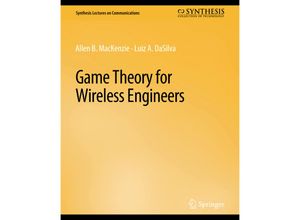The application of mathematical analysis to wireless networks has met with limited success due
to the complexity of mobility and traffic models coupled with the dynamic topology and the
unpredictability of link quality that characterize such networks. The ability to model
individual independent decision makers whose actions potentially affect all other decision
makers makes game theory particularly attractive to analyze the performance of ad hoc
networks.Game theory is a field of applied mathematics that describes and analyzes interactive
decision situations. It consists of a set of analytical tools that predict the outcome of
complex interactions among rational entities where rationality demands a strict adherence to a
strategy based on perceived or measured results. In the early to mid-1990's game theory was
applied to networking problems including flow control congestion control routing and pricing
of Internet services. More recently there has been growing interest in adopting game-theoretic
methods to model today's leading communications and networking issues including power control
and resource sharing in wireless and peer-to-peer networks.This work presents fundamental
results in game theory and their application to wireless communications and networking. We
discuss normal-form repeated and Markov games with examples selected from the literature. We
also describe ways in which learning can be modeled in game theory with direct applications to
the emerging field of cognitive radio. Finally we discuss challenges and limitations in the
application of game theory to the analysis of wireless systems. We do not assume familiarity
with game theory. We introduce major game theoretic models and discuss applications of game
theory including medium access routing energy-efficient protocols and others. We seek to
provide the reader with a foundationalunderstanding of the current research on game theory
applied to wireless communications and networking.

